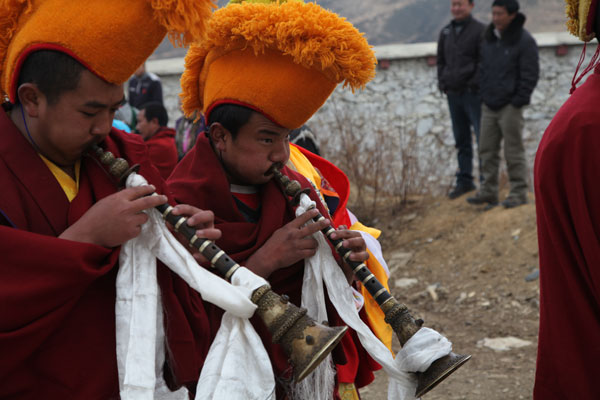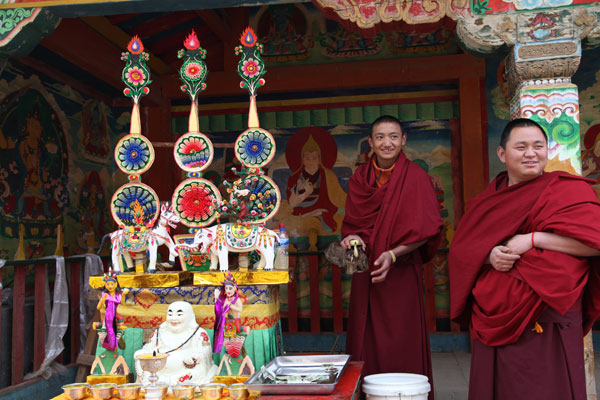The way of kindness
By Hu Yongqi and Li Yingqing in Shangri-La, Yunnan ( China Daily ) Updated: 2013-11-18 07:44:17
 |
|
Tibetan monks take part in a ceremony to invite Buddha to visit Ganden Sumtsenling Monastery in Shangri-La, Yunnan province. Shen Bo / for China Daily |
Tibetan monks debate the best way to help people who are suffering, report Hu Yongqi and Li Yingqing in Shangri-La, Yunnan province.
Clinging to a mountainside, the monastery painted dark red and golden yellow was clearly visible among a dense cluster of ethnic houses. The sound of repeated hand claps came from the yard of a pentagon-shaped wooden building as the debating class began, as it always does, at 2:30 pm at Dondrup Ling Monastery, a Buddhist foundation, in Deqen county in northwestern Yunnan province.
"For Tibetans, the meaning of life is to offer kindness and help to those who have suffered calamities - so what is the best way of doing that ... by chanting scriptures or making donations?" asked Tengpa Gyestang, a 17-year-old monk. His classmates then spoke for or against each viewpoint, using examples from classical Tibetan Buddhist scriptures to illustrate their arguments.
The monks debated back and forth, their traditional garments exposing their arms even as the temperature fell in late October. When the discussion ended, a show of hands was taken to decide how diligent each monk had been during class.
This is a typical afternoon for the 2,340 monks in the Diqing Tibetan autonomous prefecture, where more than 120,000 people - 73 percent of the population who claim a belief in religion - follow Buddhism, according to the Diqing bureau of religious affairs.
 |
|
Monks make butter sculptures to celebrate the Buddha-Greeting Festival at Ganden Sumtsenling Monastery in Shangri-La, Yunnan province. Shen Bo / for China Daily |
Dondrup Ling Monastery is an automatic destination for Tibetan Buddhists in Benzilan. The second-highest building, a towering wooden edifice, is where the monks study the scriptures; the classrooms are on the first floor and dormitories on the second. Even during the midday break, Tengpa Gyestang and his roommates sat in their dorm and held a heated discussion about the classics.
Seated on traditional yellow cushions, Tengpa Gyestang turned to his fellow monks and posed around 50 questions about the five classics books of the Gelug sect. The person who answered the question had to respond and then end their answer by clapping their hands.
Usually, young monks like Tengpa Gyestang have to study the classics for at least 15 or 20 years to obtain their Geshe degree - the highest level of attainment for Tibetan Buddhist monks. At Dondrup Ling, the seven Geshe-degree holders are regarded as the most learned and are visited by other monks for their views on questions concerning the scriptures.
Since the 1980s, the monastery has developed from a small temple to a community of hundreds of houses for the monks and the monastery's Living Buddha. In the view of the residents, the booming local economy and joint management system operated by the monasteries and local governments has resulted in a peaceful atmosphere where they can devote themselves to the study of Buddhism.